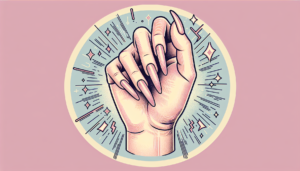Essential Vitamins for Strong Nails
Essential Vitamins for Strong Nails
Strong, healthy nails are a reflection of overall wellness. Their condition can indicate not only our diet but also our general health status. While frequent manicures and nail treatments can beautify them temporarily, the real foundation of strong nails lies beneath the surface—in our diet. This article focuses on the essential vitamins and nutrients vital for maintaining strong, resilient nails.
1. Biotin: The Nail Savior
Biotin, also known as vitamin H or B7, is a water-soluble B vitamin that is essential for healthy skin, hair, and, notably, nails. It plays a crucial role in keratin production, a key protein that forms the structure of nails.
-
Benefits: Biotin improves nail thickness, reduces brittleness, and encourages growth. Studies indicate that individuals supplementing biotin experience significantly reduced occurrences of breakage and splitting.
-
Sources: Biotin is found in various foods:
- Egg yolks
- Nuts (particularly almonds and walnuts)
- Legumes (such as peanuts and soybeans)
- Whole grains (like oats and barley)
- Cauliflower and mushrooms
- Recommended Dosage: For adults, a daily intake of 30 micrograms is typically recommended; however, higher doses may be suggested for those with specific deficiencies.
2. Vitamin E: Antioxidant Powerhouse
Vitamin E is primarily known for its antioxidant properties, protecting cells from oxidative stress. This vitamin supports healthy circulation, which is vital for delivering necessary nutrients to the nail matrix.
-
Benefits: Vitamin E aids in maintaining nail moisture and flexibility, preventing breakage. Additionally, it can reduce the likelihood of nail infections.
-
Sources: Incorporating vitamin E into your diet is straightforward, as it is present in many foods:
- Nuts and seeds (especially sunflower seeds and almonds)
- Spinach and broccoli
- Avocado
- Sweet potatoes
- Recommended Dosage: The daily recommended amount for adults is about 15 mg (22.4 IU). It can also be applied topically for additional nail health benefits.
3. Vitamin A: Growth and Repair
Vitamin A is crucial for cell growth and division, making it fundamental for nail formation. It also helps maintain healthy skin around the nails, reducing the risk of hangnails and other issues.
-
Benefits: Adequate vitamin A intake promotes the health of the nail bed and surrounding tissues, assisting in overall nail structure integrity.
-
Sources: There are two types of vitamin A: preformed vitamin A (found in animal products) and provitamin A carotenoids (found in plant foods). Good sources include:
- Liver
- Carrots
- Sweet potatoes
- Dark leafy greens (like kale and spinach)
- Red bell peppers
- Recommended Dosage: The recommended daily allowance for adults is 900 mcg for men and 700 mcg for women.
4. Vitamin D: Support for Health
Vitamin D is known predominantly for its role in bone health, but it also impacts the health of nails by supporting the immune system and enhancing calcium absorption.
-
Benefits: Insufficient vitamin D levels can lead to weak and brittle nails. Ensuring adequate levels may help strengthen nails and prevent infections.
-
Sources: Naturally synthesized by the body through sunlight exposure, dietary sources include:
- Fatty fish (like salmon and mackerel)
- Cod liver oil
- Fortified dairy products and cereals
- Egg yolks
- Recommended Dosage: Adults should aim for 600 IU daily but may require higher doses based on individual needs, particularly in areas with limited sunlight.
5. Vitamin C: Collagen’s Best Friend
Vitamin C is well known for its immune-boosting properties, but it also plays a pivotal role in collagen synthesis, a protein crucial for maintaining nail structure.
-
Benefits: It aids in repairing damaged tissues and strengthens the nail structure, making nails less prone to chipping and breakage.
-
Sources: Rich sources of vitamin C include:
- Citrus fruits (oranges, lemons, and grapefruits)
- Strawberries
- Bell peppers
- Kiwi
- Broccoli
- Recommended Dosage: The daily recommended intake is 90 mg for men and 75 mg for women.
6. Folate (Vitamin B9): The Growth Factor
Folate is essential for cellular division and DNA synthesis, playing a critical role in the growth and repair of tissues, including nails.
-
Benefits: Sufficient folate levels ensure that nail growth occurs optimally, reducing the risk of slow growth and weak nails.
-
Sources: Incorporate folate into your diet with:
- Dark leafy greens (spinach, kale)
- Legumes (lentils, chickpeas)
- Fortified cereals
- Asparagus
- Recommended Dosage: The recommended daily allowance for adults is 400 mcg.
7. Zinc: The Mineral for Strength
Zinc is a trace mineral that is vital for numerous biological functions, including maintaining the integrity of cell membranes. It plays a significant role in protein synthesis, which is crucial for nail growth.
-
Benefits: Zinc deficiency can lead to white spots on nails, slow growth, and increased fragility. Ensuring adequate zinc levels can promote stronger, healthier nails.
-
Sources: Top dietary sources of zinc include:
- Oysters (the richest source)
- Red meat and poultry
- Beans
- Nuts (especially cashews and almonds)
- Whole grains
- Recommended Dosage: The adequate intake for adults is 11 mg for men and 8 mg for women.
8. Omega-3 Fatty Acids: Nourishing Oils
While not vitamins, omega-3 fatty acids are essential fats that contribute to nail health. They help keep the nails moisturized and promote overall smoothness and resilience.
-
Benefits: Omega-3s can prevent dryness and brittleness, making nails less likely to chip or break.
-
Sources: Supercharge your diet with omega-3-rich foods:
- Fatty fish (salmon, mackerel, sardines)
- Flaxseeds
- Chia seeds
- Walnuts
- Recommended Dosage: Aim for at least 250 to 500 mg of combined EPA and DHA daily.
9. Iron: The Growth Catalyst
Iron is a crucial mineral that plays a role in oxygen transport in the blood. A deficiency often leads to pronounced symptoms, including brittle nails and white spots.
-
Benefits: Iron promotes healthy nail growth and reduces the likelihood of developing ridges or pits in the nails.
-
Sources: Important sources include:
- Red meat
- Beans and legumes
- Dark leafy greens
- Fortified cereals
- Quinoa
- Recommended Dosage: Adult men require about 8 mg daily, while women need 18 mg due to menstruation.
10. Silica: The Strengthening Agent
Silica is not a vitamin, but it plays a crucial role in strengthening nails and enhancing their overall appearance.
-
Benefits: Silica supports the structural integrity of nails, helping to prevent ridges and breakage.
-
Sources: Include silica-rich foods like:
- Whole grains
- Bamboos (bamboo shoots)
- Green beans
- Cucumbers
- Recommended Dosage: While no specific daily requirement is established, a balanced diet containing silica-rich foods typically suffices.
11. Water: The Essential Hydrator
Lastly, adequate hydration is indispensable for nail health. While water is not a vitamin, it is essential for maintaining moisture levels both in the nails and the surrounding skin.
-
Benefits: Dehydration can lead to dry, brittle nails. Drinking enough water ensures that nails remain hydrated, promoting growth and strength.
-
Sources: Drinking water is the most straightforward way to stay hydrated, but you can also consume fluid-rich fruits and vegetables like:
- Watermelon
- Cucumber
- Lettuce
- Celery
- Recommended Dosage: Aim for at least eight 8-ounce glasses of water daily, adjusting based on individual needs and activity levels.
Key Takeaways
To grow strong, healthy nails, a balanced diet rich in vitamins and minerals is essential. Incorporating biotin, vitamins A, C, D, E, folate, zinc, iron, silica, and omega-3 fatty acids will fortify your nails from the inside out. Additionally, staying hydrated is crucial for overall nail health. Consider consulting with a healthcare provider before making significant dietary changes or starting new supplements.








